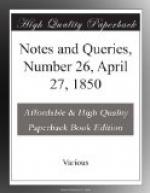P.H.F.
March 23, 1850.
Ecclesiastical Year (No. 24. p. 381.).—The following note on the calendar is authority for the statement respecting the beginning of the ecclesiastical year:—
“Note that the Golden Number and the Dominicall letter doeth change euery yeere the first day of January. Note also, that the yeere of our Lord beginneth the xxv. day of March, the same supposed to be the first day upon which the world was created, and the day when Christ was conceived in the womb of the Virgin Mary.”
As in the Book of Common Prayer, Lond. 1614, p. 2. Bishop Cosins remarks, “beginneth the 25th day of March.”
“Romani annum suum auspicantur ad calendas Januarias. Idem faciunt hodierni Romani et qui in aliis regnis papae authoritatem agnoseunt. Ecclesia autem Anglicana sequitur suppotationem antiquam a Dionysio Exiguo inchoatum, anno Christi 532.”
Nicholl’s Commentary on the Book of Common Prayer, additional notes, p. 10. Fol. Lond. 1712, vid. loe.
In the Book of Common Prayer, Oxford, 1716, the note is,—
“Note.—The
supputation of the year of our Lord in the Church
of England beginneth the five-and-twentieth
day of March.”
This note does not now appear in our Prayer Books, being omitted, I suppose, in consequence {421} of the adoption of the new style in England in 1752. The daily course of lessons used to begin, as it does now, with the Book of Genesis and of St. Matthew, in January; the collects, epistles, and gospels with those for Advent.
M.
Oxford.
Paying through the Nose (No. 21. p. 335.).—I have always understood this to be merely a degenerated pronunciation of the last word. Paying through the noose gives the idea so exactly, that, as far as the etymology goes, it is explanatory enough. But whether that reading has an historical origin may be another question. It scarcely seems to need one.
C.W.H.
Quem Deus vult perdere, &c. (No. 22. p. 351.).—The correct reading is, “Quem Jupiter vult perdere, dementat prius.” See Duport’s Gnomologia Homerica, p. 282. (Cantab. 1660.) Athenagoras quotes Greek lines, and renders them in Latin (p. 121. Oxon. 1682):
“At daemon homini quum struit aliquid
malum,
Pervertit illi primitus mentem suam.”
The word “dementat” is not to be met with, I believe, in the works of any real classical author. Butler has employed the idea in part 3. canto 2. line 565. of Hudibras:
“Like men condemned to thunderbolts,
Who, ere the blow, become mere dolts.”
C.I.R.




